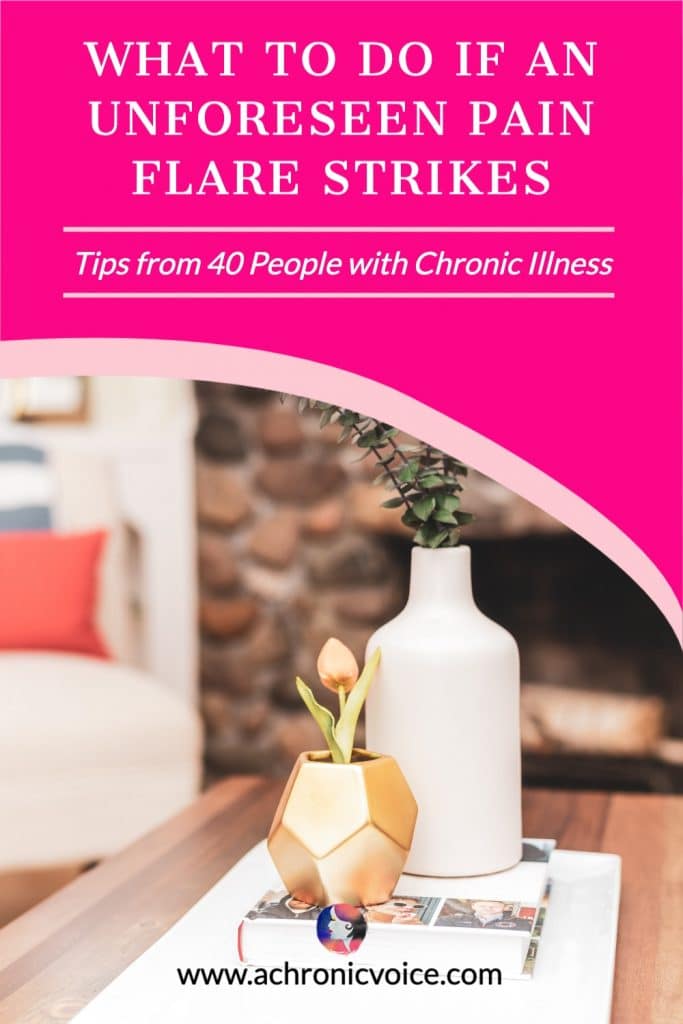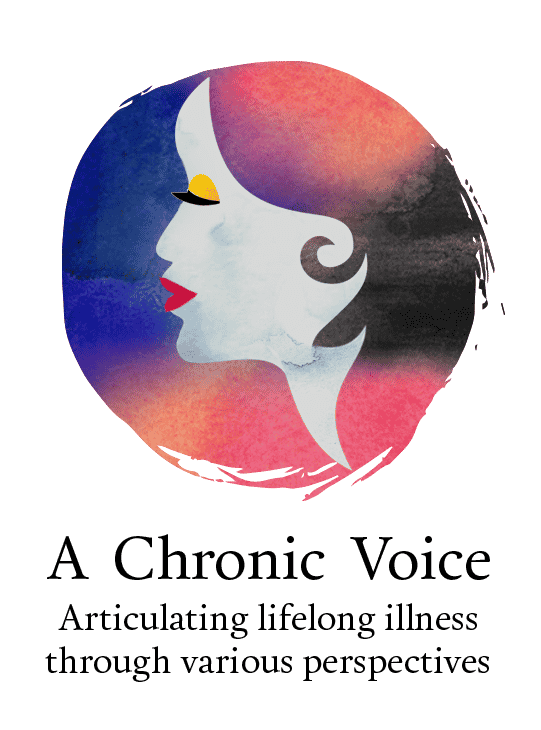The Final Instalment to the Pain Flare Series: Pain Management Tips
In part one everyone shared what their biggest triggers are, and in part two their best tips for prevention, which is definitely better than cure. But what happens if you land right smack in the middle of that dreaded flare anyway? Do you have a pain management plan in place?
Those who live with chronic illnesses are often on a neverending life quest for balance. They need to be aware at all times of the balance in their energy banks, to ensure that they don’t overdraw. Yet sometimes they find themselves in a pain flare anyway, even if they’ve been practicing self-care daily; chronic illness is just an unpredictable beast.
Perhaps it might get bored and wander away some day but in the meantime, here’s everyone’s best pain management tips for riding out that much dreaded pain flare.
Pin to Your Chronic Pain Management Boards:


My Best Tip for Coping with a Pain Flare if It Happens Anyway is:
“I have warm baths, the heat always helps with extra pain. I try and accomplish something small even if it’s just having a bath or changing into different clothes, then I don’t feel as bad if I’m sat in bed all day. I think doing something like that helps mentally.”
– Abbey –
“Lying down and making sure my mind is occupied by reading or watching a show.”
– Sreetama –
“Take the needed day or two ‘off’ and stop adding things to your plate. Think about what caused the flare, and normalize it (that really is a lot of pressure, anybody would be upset…or ‘that felt really rough, but now we are past the worst of it, and we can do what’s left), and make a plan for next steps as you feel better.”
– Alison –
“Don’t beat yourself up, just give your body what it needs right now. Rest, love and nourishment.”
– Rachel Hill –
“There is no way to properly prevent this from happening other than avoiding these situations, so instead I try and go with the flow of the stimuli that tends to overload my system rather than fight it. In other words, I sit with it until my body and mind acclimate.”
– Tom Seaman –
“At this point I need rest. I also take an Epsom salt bath and a magnesium pill. And I have a balm that is great for really sore areas. Then lay down with a heat pad and relax.”
– Nikki Albert –
“Rest and let it ride. I don’t fight flares or try to push through them. I find that by allowing them to happen and resting into them I can limit how long they last.
In addition to rest I find that making sure I stay well hydrated and eat properly when I’m feeling bad helps reduce how long the flare lasts.”
– Julie Ryan –
“Love after yourself and take a step back from life. Never feel guilty for asking for help and reassurance.”
– Candace –
“Rest and be kind to yourself. Cancel non-urgent plans, they can wait for another day.”
– Jo Moss –
“Rest. Always allow yourself to rest. We live in a busy world where taking time to recover can be looked down on, but you always need to make time for yourself and your body. For muscle issues in particular: a good TENS unit and hot packs can help a lot.”
– Kyra –
“Sleep, rest, keep my mind occupied, going to the beach, spending time with my animals.”
– Michelle –
“To rest as much as possible, and to just look after myself. To also talk to others for support.”
– Heather –
“Having a ‘self-care box’ has really helped, especially on the days when I am unable to get out of bed. My self-care box contains everything that comforts me, enabling me to cope better during times of stress and suffering. Books, magazines, favourite films and TV shows – anything to distract me from pain and other debilitating symptoms.”
– Rhiann –
“Reduce walking, lots of cold compress.”
– Lin Shuwen –
“Stop, reduce inputs (close computers, turn off phone) and get a book or a drink and focus on that one thing alone.”
– Fibro Jedi –
“Move, rest.”
– Jessica –
“If a flare up can’t be avoided, people will contact their chronic UTI specialist for advice; temporarily double-up on their medication (ie antimicrobials, d-mannose etc) until symptoms settle; take bicarb soda in water or over the counter cystitis sachets to ease bladder burning; use heat or ice packs over the lower abdomen; take anti-inflammatory medication; rest in a position that helps ease bladder pain symptoms; be careful with diet while the bladder is raw and unsettled.”
– Chronic UTI Australia –
“Rest, relax and call my doctor. He’s pretty good at fitting in patients immediately if they are going through a flare up.”
– Effie –
“I load up on my mast-cell stabilizers and take it really easy for the week or so after the flare.”
– Sara Russell –
“I have two flare survival kits that help me when I’m flaring. One is in our car and it’s there for when I flare outside of our home. The other is in the drawer beside my bed. Both bags are packed with extra medications, ‘snap’ heating packs, a coloring book and markers, a book, pain patches and pain cream, compression wraps, a small foam pillow, and a soft blanket to wrap up in. Immediate rest is best. I strictly limit my walking and standing time. (Some activities are worth a flare, though.)”
– Carrie Kellenberger –
“Accept it, allow the emotions it triggers, but be careful to not add any meaning to it about what it means for the future. Then, to distract myself and make myself as comfortable as possible while I wait for the worst to pass.”
– Julie Holliday –
“There’s no getting round it really. With Severe ME the flare up happens every time despite my best efforts to prevent it. I will stay in bed for at least two days after my bath, keep my muscles warm, but have cooling pads ready for spinal inflammation and hot flushes.
I keep curtains shut and lights off and everybody stays quiet in the house. Only one person can come into my room at a time and they must speak in whispers. They will bring me food and drinks and I will only get up to go to the toilet – I’ll use a walker for support and wear sunglasses as the bathroom curtains are not the blackout variety.
My top tips would be to listen to your body – rest as much as your body needs you to. Rest well – this includes silence, darkness and warmth. Hydrate and eat well. Use distraction like Netflix, colouring, audio books or music if you can. Don’t feel guilty – rest is a vital part of managing chronic illness! Be kind to yourself.”
– Chronically Hopeful Char –
“Basically waiting till it’s over by resting and trying to distract from the pain by watching funny tv shows/movies, listening to music/podcasts or reading, talking to friends and family.”
– Kirsten –
“Knowing that it will pass eventually, that what I’m feeling is OK, and doing deep breathing techniques. Having someone understanding present always helps too.”
– Em –
“When you realise a flare up is happening you need to stop and realistically think what can you still do! Some plans are going to have to change- it sucks but you need to give yourself the break. Your health has to take priority or it’ll just keep getting worse.”
– Ruthy –
“CBD oil, vitamin D, anti-inflammatory meds, crying, cussing.”
– Alice hightower –
“My best tip for coping with a flare up is to rest, rest, rest. Treat yourself kindly and give yourself as much time as you need to recover.”
– Jenny Clarkson –
“Having a list of still tasks like batching social media for flare days, or even giving up and streaming Good Witch with my daughter. I also keep medical marijuana topical to stop the spasms so I can relocate joints.”
– Monica Laipple –
“Taking everything off the table that I can (i.e. reducing what I have to do as much as possible) in order to rest body, mind and soul.”
– Kirsten Cliff Elliot –
“Rest, mindfulness, hypnosis, eat well (avoid triggers), hydration, time in nature!”
– Amanda Malachesky –
“I cope with flare ups by de-stressing. I lay down and try to watch or listen to something funny… Laughter ALWAYS gets me through.”
– Audrey Housworth –
“Rescue medication, self care, FMLA to take time off work, and a support system.”
– Hell’s Bells and Mast Cells –
“If I flareup despite my best efforts to thwart it, I give in to it! I don’t try to fight against it by plowing forward despite it. When I have to stop, I stop. If I need to lay down, I lay down. I decided long ago to not try to prove anything to anyone or any flareup. It is a setup for misery.”
– Lynn Clark –
iamlynnclark.com
“Solitude and quiet to focus completely on myself, self care and basic needs. Just ride it out until it passes, which it always does.”
– Taylor –
“To stop what I’m doing, sit down and rest, and listen to relaxing music. I also use heat and/or ice to help alleviate the pain and rub Magnesium Gel into the areas that hurt the most. I rework my schedule so I’ve given myself more rest time and I allow myself permission to take a break.”
– Pamela Jessen –
“Pacing yourself and asking for help before you get to ‘I’m desperate!’.”
– Lotty –
“Nothing helps when a big pain flare hits, not even strong pain meds. I’ve learned that only steroids help to control the unbearable pain, but increasing them to such a high dose always brings along a whole new set of mental problems. Honestly it’s a balance of how much physical pain I can bear against the mental side effects. Then, I just switch everything off or out of my life and rest up.”
– Sheryl –
In Conclusion: Common Pain Management Themes & Some Creative Ones!
As you can see from this roundup, pacing, self-compassion and resting are common themes. It isn’t about giving in to the pain and struggle, but allowing yourself to retreat so that you can heal. Which of these pain management tips do you use to cope with pain flares for yourself? Did you find a new pain management strategy from this list? I would love to hear from you in the comments below!
The article is based on each individual’s own experiences, and nothing should be taken as medical advice. Always be sure to check with your doctor before you start on any new treatment or protocol, whatever that may be.
If you liked this article, sign up for our mailing list here so you don’t miss out on our latest posts! You will also receive an e-book full of uplifting messages, quotes and illustrations, as a token of appreciation!
Pin to Your Chronic Pain Management Boards:





When Pain strikes, I like to chop up fresh Ginger and make a tea
That sounds like a good and simple way to help, too 🙂
As always, a great round-up of tips and advice from experts and veteran patients. I love these compilation lists! Thanks for taking the time to put them all together for us!
I like doing roundups like these from the community as everyone as such important and useful tips and perspectives to share! What I aim to do with the blog, really! Thanks always for your contributions as well! 🙂
Thanks Carrie! It’s always interesting to see and read what other spoonies do for their pain flares and more, too!
So many good suggestions! I also watch a TV show or film, try Epsom salt baths on and off (when dysautonomia doesn’t make baths a tricky thing to do) and love a hot water bottle.
That’s great! Can I add them to this post? 😉
I love Carrie’s idea of having a flare kit in the car and at home. Her ideas for what to put in it sound helpful, too. So many great ideas. For me, it’s a blue tooth eye mask and Insight timer for guided meditation.
What’s great about this list is that it shows how different things work for different people. Finding what works for us individually is important. My favourite one here is the self-care box by Rhiann. For my fibro, I find my diet is so important. When I have a flare up or a crap day, reading and writing keeps my mind of it.
Hi Gloria, thanks for taking the time to read and understand! Yes everybody is different, and what works for one will not work for another. Rhiann does have fab ideas for self-care! And yes diet is underrated but can influence just about everything! Writing is also my own way of coping 😉 x
I love how you laid this post out and shared all of the ideas from others. This is excellent. I have several friends and family members who live with chronic pain and I am going to share these tips on Facebook. I think the theme in many of these is to acknowledge it, not fight it. Work with the pain and move through it, rather than resist. That’s a good way to think about a lot of the factors in our lives we can’t control. Thank you for the post.
Hi Angela, thank you for taking the time to read everyone’s responses, and even deducing a common theme through them! Yes, as someone with chronic pain something we learn is that others may not, is that pain has no limit and we are faced with our mortality every day. Acceptance is the only way to get through it in the end. And you are so right that this applies to many areas of life, not just pain, as well.
Thank you for sharing this post. I hope it helps your friends and family, too. They are really blessed to have someone like you in their lives 🙂
What an amazing collation, such great ideas & inspiration! Thanks for all your hard work in getting it all together 🙂
Thanks Caz! This is thanks to all the contributors who shared 🙂